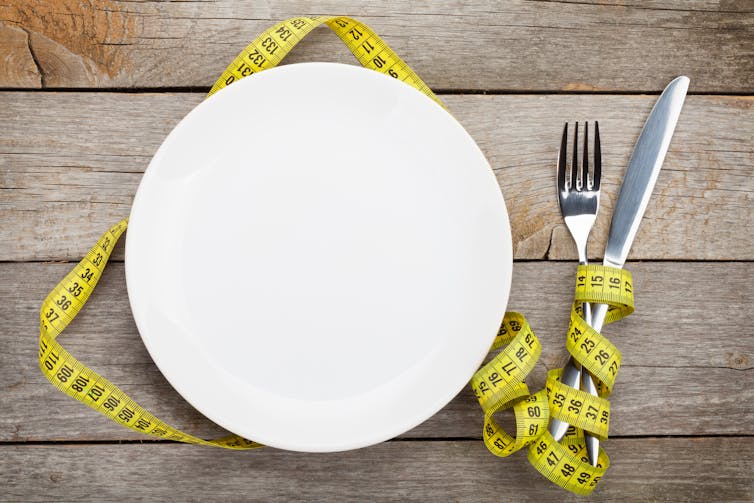Nick Fuller, University of Sydney
If you’ve ever tried to lose weight but found the kilos return almost as quickly as they left, you’re not alone.
In fact, the challenge of maintaining weight loss is confirmed by research, including an analysis of 29 long-term weight loss studies that found more than half of the weight lost by participants was regained within two years, and more than 80 per cent of lost weight was regained within five years.
When we regain weight, we tend to blame it on a lack of willpower.
But there’s a scientific reason many people return to their previous weight after dieting, and understanding the science – known as the weight set point theory – is key to achieving long-term weight loss.
What is the weight set point?
We each have a predetermined weight – a set point – which our body protects. It’s the weight you’ll remember being at for a long period of time in your adult years (over 20 years of age) and it’s the weight you’ll remember bouncing back to after any bout of dieting.
It’s programmed in the early years of life – particularly during the first 2000 days of life – from conception to five years of age. Our genes play a role in programming our weight set point. Just as DNA prescribes whether we’re shorter or taller than others, we’re born with a tendency to be slim or overweight. But our genetic make-up is just a predisposition, not an inevitable fate.
Weight set point is also influenced by the environmental factors genes may be exposed to during pregnancy and the first years of life. It explains why some children who are fed a poor diet are more susceptible to unhealthy weight gain (due to their genetic make-up) while others are not. Research shows unhealthy weight gain during the early years of life is likely to persist throughout adolescence and adulthood.

ben wicks/unsplash, CC BY
Lastly, our body weight is influenced by the environment itself. For example, an unhealthy diet, sedentary lifestyle and poor sleep will result in an increase in your weight set point over time and at a rate of 0.5 kilograms per year.
Our bodies work hard to keep our weight around our set point by adjusting our biological systems, regulating how much we eat, how we store fat and expend energy. This stems from our hunter-gatherer ancestors, whose bodies developed this survival response to adapt to periods of deprivation when food was scarce to protect against starvation. Unfortunately, this means our body is very good at protecting against weight loss but not weight gain.
How our bodies work to protect our set point when we diet
When we change our diet to lose weight, we take our body out of its comfort zone and trigger its survival response. It then counteracts weight loss, triggering several physiological responses to defend our body weight and ‘survive’ starvation.
Our body’s survival mechanisms want us to regain lost weight to ensure we survive the next period of famine (dieting), which is why many people who regain weight after dieting end up weighing more than when they started.
Our bodies achieve this result in several ways.
1. Our metabolism slows and our thyroid gland misfires
Our metabolic rate – how much energy we burn at rest – is determined by how much muscle and fat we have. Muscle is more metabolically active than fat, meaning it burns more calories. Typically, when we diet to lose weight, we lose both fat and muscle, and the decrease in our calorie-burning muscle mass slows our metabolism, slowing the rate at which we lose weight.
Research also shows that for every diet attempt, the rate at which we burn off food slows by 15 per cent and that even after we regain lost weight, our metabolism doesn’t recover. But exercise can help restore and speed up our metabolism as it improves our muscle to fat ratio.

Shutterstock
Dieting also affects our thyroid gland – the gatekeeper to our metabolism. When our thyroid functions correctly, it produces vital hormones that control our energy levels and metabolism, but when we restrict our food intake, fewer hormones are secreted, reducing the energy we burn at rest
2. Our energy sources are used differently
Our bodies predominantly burn fat stores at rest, but when we diet and start losing weight, our body adapts for protection. It switches from using fat as its energy source to carbohydrates and holds onto its fat, resulting in less energy being burned at rest
3. Our appetite hormones adjust
Appetite hormones play a large part in weight management. When we’re hungry, the stomach releases a hormone called ghrelin to let our brain know it’s time to eat. Our gut and fat tissue also release hormones to signal fullness and tell us it’s time to stop eating.
However, when we diet and deprive our bodies of food, these hormones work differently to defend our set point weight, suppressing feelings of fullness and telling us to eat more. Like our metabolism, appetite hormones don’t return to the same levels before dieting, meaning feelings of hunger can prevail, even after weight is regained
4. Our adrenal gland functions differently
Our adrenal gland manages the hormone cortisol, which it releases when a stressor – like dieting – is imposed. Excess cortisol production and its presence in our blood leads to weight gain because it plays a vital role in how our bodies process, store and burn fat
5. Our brain works differently
Typically, diets tell us to restrict certain foods or food groups to reduce our calorie intake. However, this heightens activity in our mesocorticolimbic circuit (the reward system in our brain) resulting in us overeating the foods we’ve been told to avoid. This is because foods that give us pleasure release feel-good chemicals called endorphins and a learning chemical called dopamine, which enable us to remember – and give in to – that feel-good response when we see that food.
When we diet, activity in our hypothalamus – the clever part of the brain that regulates emotions and food intake – also reduces, decreasing our control and judgement. It often triggers a psychological response dubbed the ‘what-the-hell effect’ – the vicious cycle we enter when we indulge in something we feel we shouldn’t, feel guilty about it, and then go back for even more.
The take-home message
We are biologically wired to protect our weight set point. Conventional diets, including the latest hype surrounding ‘intermittent fasting’ and ‘keto’, fail to promote healthy eating and fail to address the weight set point. You’ll eventually regain the weight you lost.
Just as the problem is evolutionary, the solution is evolutionary too.
Successfully losing weight long-term comes down to:
- following evidence-based guidelines from healthcare professionals who have studied the science of obesity, not celebrities
- losing weight in small manageable chunks you can sustain, specifically periods of weight loss, followed by periods of weight maintenance, and so on, until your goal weight is achieved
- making gradual changes to your lifestyle to ensure you form habits that last a lifetime.
Nick Fuller, Charles Perkins Centre Research Program Leader, University of Sydney
This article is republished from The Conversation under a Creative Commons licence. Read the original article.
Do you find it hard to keep weight off? What strategies have worked for you? Let us know in the comments section below.


Yeah… Nah. I don’t agree.
My own experience was to put on enough weight to be classed as morbidly obese by judging fine-dining restaurants for a few years in a row. Those years were also too busy to exercise in the way that I thought then that I should. And even though I signed up to a local gym, the other fat people I saw every week, running on treadmills, cycling or doing aerobics classes never seemed to lose anything but the cost of their gym membership.
Eventually, life as someone carrying around an excess 50kg got the better of me and I decided to do something about it.
My work with wild foods provided me with an amazing toolbox of phytonutrient-rich ingredients to test a hypothesis I had. When I was out bush with my aunties up in the Top End or over in the north of Cape York or the other side of the country, in the Kimberley, I could not fail to be impressed with my informants, the female Elders – who shared so much with me knowing that I would put it to good use.
These incredible women in their 60s and older, could walk all day in 40-plus degrees. Through mangroves, even climbing the trees or hunting around their bases and hooking out huge mud-crabs before stuffing them into hessian sacks for ME to carry. Finding yams in vine thickets at the edge of the mangroves and stopping to dig, well actually, getting me to dig down to a metre or more as my instructions were never to break the yam but get it out whole. Hard work, I can tell you.
I can tell you these women had magic feet in that they could glide over the soft mud, pick long bum, oysters and nerites (different shellfish) from the mangrove roots, spear a stingray in the shallows and move on to where they knew they wanted to camp for a meal around noon.
My progress was somewhat different. I had a camera around my neck, a backpack with fresh water, camera lenses and stuff as well as sample jars and bags for wild foods I intended to collect for analysis when I was back in Sydney. I also had the sack with 6 or more mud-crabs which weighed 2 – 3 kg each.
When I stepped out on the mud, I sank up to mid-thigh so every step was a massive exercise of breaking free of the suction, making sure I still had my runners on and stepping out into more of the sticky grey goo. Slow progress and I had to work really hard not to fall so far behind, I’d be in trouble for being late bringing the sack of crabs for our brunch.
Anyway. I learned a lot.
Wild foods stop hunger very effectively. It seems we suffer from Hidden Hunger or a phytonutrient deficiency and it is our taste drives and our gut bugs that induce us to keep eating until we get enough of these special food components that we need.
The problem is that modern foods are deficient in phytonutrients with some entire classes of antioxidants, for example, bred out of our fruits. These same compounds account for up to half the (very impressive) antioxidant capacity of wild fruits.
We are eating rubbish produce – low in phytonutrients, low in fibre, high in bad sugars (sucrose and fructose), pumped up with water (juicy) and so the are big, sweet and not worth the eating.
The way I lost my excess weight going from 135kg down to my now stable weight of 83 – 84kg was with wild foods, listening to my body’s needs and not eating through habit alone, choosing modern fruits with low sugar content, high fibre vegetables, low fat and game meats, drinking lots of water, cutting back on alcohol and only eating 2 meals a day since that was all I felt I needed.
I also exercised like my Indigenous family – find a crab or a stingray, work like crazy to catch it. Hunt roos, possums, rabbits or goanna etc, then do the work here too. Chase your prey if it runs off, catch., kill and carry it back to camp. Ever lifted an adult grey kangaroo? Now you want it where?
High intensity exercise every few days. Intermittent fasting between your 2 daily meals and boost your healthy dishes with wild foods. The weight disappears slowly. You might plateau for a while but stick with it. Try to get a decent sleep each night and work on de-stressing your day to day.
Work on food, fitness, focus, friends, fellowship and fulfilment and you will not only reach your ideal weight but move towards an ideal life. Healthy to the end and with 20 or 30 years more than you would have following something like my previous lifestyle.
I expect to live to 100 and to stay as sharp and lucid as my aunties out bush the whole time. Maybe I’ll be shot in bed by the jealous ex-husband of my lover at the time. At least I’ll have a rich and meaningful life.
BTW. I now market the wild foods to use to best boost your nutrition. They also appear to improve our vitality, energy, mental focus and concentration, immunity and dispel carb cravings. Most of the diseases of nutrition appear to disappear and studies have shown that traditionally living cultures in Australia, Africa and the Americas had “extremely rare” (they failed to find any evidence of) incidences of cancer, metabolic syndrome conditions, gout or mental diseases. Indigenous Australians lived into their 70s and 80s, retained encyclopaedic memories the whole time and they all spoke 4 or 5 languages/dialects and then picked up English post-invasion. And did I mention that they maintained ideal weight from birth to the end.
Amazing story. Thanks for sharing Vic.